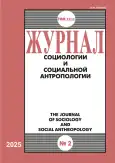Stand-up in Russia: an (un)funny and (non)toxic profession in the context of new creative spheres of professionalization
- Autores: Omelchenko D.A.1, Garifzianova A.R.2
-
Afiliações:
- HSE University
- Kazan Federal University
- Edição: Volume 28, Nº 2 (2025)
- Páginas: 92-118
- Seção: Sociology of Professions
- URL: https://bakhtiniada.ru/1029-8053/article/view/317417
- DOI: https://doi.org/10.31119/jssa.2025.28.2.4
- EDN: https://elibrary.ru/ELNPPA
- ID: 317417
Citar
Texto integral
Resumo
Palavras-chave
Sobre autores
Dmitry Omelchenko
HSE University
Email: domelchenko@hse.ru
ORCID ID: 0000-0002-5407-2304
Research Fellow, St. Petersburg School of Social Sciences, Centre for Youth Studies St. Petersburg, Russia
Albina Garifzianova
Kazan Federal University
Email: albina.garifzyanova@gmail.com
ORCID ID: 0000-0001-8399-8205
Código SPIN: 9706-0246
Researcher ID: O-3096-2016
Associate Professor, Candidate of Sciences in Philosophy, Department of General and Ethnic Sociology, Institute of Social and Philosophical Sciences and Mass Communications, Faculty of Social and Political Sciences Kazan, Russia
Bibliografia
- Батыгин Г.С. (2020) Профессионалы в расколдованном мире. Ведомости прикладной этики, 56: 158–167.
- Лэндри Ч. (2006) Креативный город. М.: Классика-ХХI.
- Магидович М.Л. (2004) Профессиональная идентичность художника. Журнал социологии и социальной антропологии, 7(3): 139–152.
- Мартьянов В. (2016) Креативный класс — креативный город: реальная перспектива или утопия для избранных? Мировая экономика и международные отношения, 60(10): 41–51. https://doi.org/10.20542/0131-2227-2016-60-10-41-51.
- Нечаев Н.Н. (2016) Профессия и профессионализм: к задачам психологии профессионального творчества. Вестник Московского университета. Серия Психология, 14(4): 3–1https://doi.org/10.11621/vsp.2016.04.03.
- Омельченко Д. (2024) Переходя границы. Российский стендап: локальные и глобальные смыслы. Антропологический форум, 60: 71–101. https://doi.org/10.31250/1815-8870-2024-20-60-71-101.
- Романов П.В., Ярская-Смирнова Е.Р. (2008) Мир профессий как поле антропологических исследований. Этнографическое обозрение, 5: 3–17.
- Слободская А. В. (2018). Прекариат и креативный класс: сравнительный анализ паттернов социальной структуры постиндустриального общества. Вестник Томского государственного университета. Философия. Социология. Политология, 42: 51–59.
- Смирнова Е.Е. (2003) На пути к выбору профессии. СПб.: Каро.
- Стендинг Г. (2014) Прекариат: новый опасный класс. М.: Ад Маргинем Пресс.
- Флорида Р. (2007) Креативный класс: люди, которые меняют будущее. М.: Классика-ХХI.
- Хокинс Дж. (2011) Креативная экономика. Как превратить идеи в деньги. М.: Классика XXI.
- Blair H. (2003) Winning and Losing in Flexible Labour Markets: the Formation and Operation of Networks of Interdependence in the UK Film Industry. Sociology, 37(4): 677–694. https://doi.org/10.1177/00380385030374003.
- Ozga J. (1995) Deskilling a Profession: Professionalism Deprofessionalisation and the New Managerialism. In: Busher H., Rene S. (eds.) Managing Teachers as Professionals in Schools. London: Routledge: 21–37.
- Butler N., Stoyanova Russell D. (2018) No funny business: Precarious work and emotional labour in stand-up comedy. Human Relations, 71(12): 1666–1686. https://doi.org/10.1177/0018726718758880.
- Campbell M. (2015) Creative Entrepreneurship in the Cultural Industries: Rhetoric and Realities of Youth Creative Work. In: Dhoest A., Malliet S., Segaert B., Haers J. (eds.) The Borders of Subculture. London: Routledge: 37–54.
- Dennis A., Bongiovi J. (2013) Precarious, Informalizing, and Flexible Work: Transforming Concepts and Understandings. American Behavioral Scientist, 57(3): 289–308. https://doi.org/10.1177/0002764212466239.
- Evetts J. (2003). The Sociological Analysis of Professionalism: Occupational Change in the Modern World. International Sociology, 18(2): 395–415. https://doi.org/10.1177/0268580903018002005.
- Evetts J. (2013) Professionalism: Value and ideology. Current Sociology, 61(5–6): 778–796. https://doi.org/10.1177/0011392113479316.
- Healy K. (2002) What’s New for Culture in the New Economy? The Journal of Arts Management, Law, and Society, 32(2): 86–103. https://doi.org/10.1080/10632920209596967.
- Hesmondhalgh D. (2010) User-generated content, free labour and cultural industries. Ephemera, 10(3/4): 267–284.
- Hesmondhalgh D., Baker S. (2011) Creative Labour: Media Work in Three Cultural Industries. London: Routledge. https://doi.org/10.4324/9780203855881.
- Krefting R., Baruc R. (2015) A new economy of jokes? Comedy Studies, 6(2): 129–140. https://doi.org/10.1080/2040610X.2015.1083165.
- Krefting R., Baruc R. (2015) The comedy industry is in flux, but this is in no way a new phenomenon: A new economy of jokes? Comedy Studies, 6(2): 129–140. https://doi.org/10.1080/2040610X.2015.1083165.
- Lingo E. L., Tepper S. J. (2013) Looking Back, Looking Forward: Arts-Based Careers and Creative Work. Work and Occupations, 40(4): 337–363. https://doi.org/10.1177/0730888413505229.
- Millerson G.L. (1964) The Qualifying Association: A Study in Professionalization. London: Routledge. https://doi.org/10.4324/9781315007434.
- Nallon S. (1999) Oliver Double Stand-Up! On Being a Comedian London: Methuen. New Theatre Quarterly, 15(3): 286–286. https://doi.org/10.1017/S0266464X00013142.
- Neff G., Wissinger El., Zukin S. (2005) Entrepreneurial Labor among Cultural Producers: “Cool” Jobs in “Hot” Industries. Social Semiotics, 15: 307–334. https://doi.org/10.1080/10350330500310111.
- Reilly P. (2017) The Layers of a Clown: Career Development in Cultural Production Industries. Academy of Management Discoveries, 3(2): 145–164. https://doi.org/10.5465/amd.2015.0160.
- Roberts T. (2014) Modified People: Indicators of a Body Modification Subculture in a Post-Subculture World. Sociology, 49(6): 1096–1112. https://doi.org/10.1177/0038038514554672.
- Standing G. (2011) The Precariat: The New Dangerous Class. London: Bloomsbury Academic.
- Threadgold S. (2015) Subcultural Capital, DIY Careers and Transferability: Towards Maintaining Reproduction When Using Bourdieu in Youth Culture Research. In: Baker S., Robards B., Buttigieg B. (eds.) Youth Cultures and Subcultures. Ashgate: 53–64.
- Throsby D. (2012) Artistic labour markets: Why are they of interest to labour economists? Economia della Cultura, 1: 7–16. https://doi.org/10.1446/37378.
- Troman G. (1996) The rise of the new professionals? The restructuring of primary teachers’ work and professionalism. British Journal of Sociology of Education, 17(4): 473–487.
- Vosko L.F. (2010) Managing Borders: Gender, Citizenship, and the International Governance of Precarious Employment. New York: Oxford University Press. https://doi.org/10.1093/acprof:oso/9780199574810.001.0001.
- Young C., Borén T. (2013) Getting Creative with the “Creative City”? Towards New Perspectives on Creativity in Urban Policy. International Journal of Urban and Regional Research, 37(5): 1799–1815. https://doi.org/10.1111/j.1468–2427.2012.01132.x.
Arquivos suplementares









